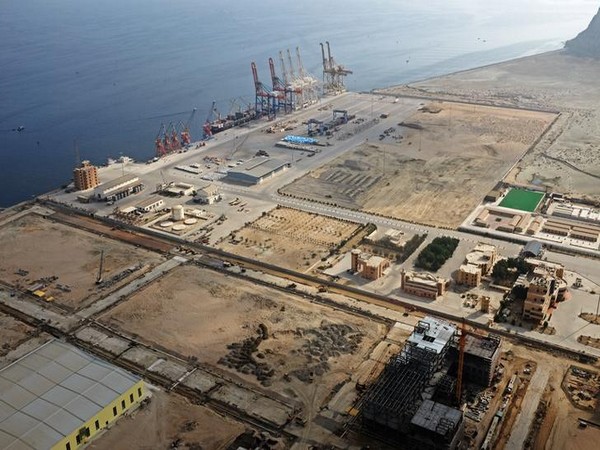
China Debt-Traps Nations With Confidentiality Clauses
Wed, 25 Aug 2021 | Reading Time: 3 minutes

Beijing [China], August 25 (ANI): China, which is the world’s largest creditor, is shockingly using confidentiality clauses barring borrowers from revealing terms and conditions of the engagement or even the existence of the debt itself.
International Forum for Right and Security (IFFRAS), reported that recent joint research by the Peterson Institute for International Economics, Kiel Institute for the World Economy and the Centre for Global Development & Aid Data concluded that it uses these contracts to debt-trap a nation.
The study referred in this article looked at 100 contracts signed during 2000 – 2020 to systemically analyse the legal terms of lending followed by Chinese state-owned entities and government borrowers across 24 developing countries in Africa, Asia, Eastern Europe, Latin America and Oceania with a commitment amounting to the tune of USD 36.6 billion.
Chinese credit terms remain highly skewed in favour of Chinese lenders over other creditors. The credit offered contains collateral arrangements, no Paris Club clauses and includes clauses allowing lenders to influence debtors’ domestic and foreign policies etc. Generally, the credit terms are kept secret from other creditors too including the IMF and other international agencies, reported IFFRAS.
The Paris Club is a group of major creditor countries with policies for extending coordinated debt relief to developing countries in addition to ensuring sustainable debt levels.
Apart from this, the Chinese also stress keeping the credit terms secret from the citizens in both the borrowing as well as the lending country, who otherwise have a legitimate right to know.
The lender is also provided with the discretion to cancel loans or demand full repayment ahead of the schedule at will. Such terms obviously equip the lenders (in this case, Chinese) to exert influence over the borrower and limit the borrower’s policy space to cancel any adverse loan or issue new environmental regulations that could impinge on the terms of the Chinese agreements.
All Chinese creditors like commercial banks, hedge funds, suppliers and export credit agencies seek influence over borrowing countries to increase the prospect of repayment by legal, economic and political means, said IFFRAS.
China has even devised unique ways of blending standard commercial and official lending terms to secure repayment in priority and in the process gain a stronger grip over the borrowing country’s economic and foreign policies.
As such, three main insights that come to the fore from an analysis of the Chinese lending pattern are as follows:
a) Chinese contracts contain unusual confidentiality clauses particularly since 2015 wherein the borrower is prevented from revealing the details.
b) Secondly, Chinese lenders seek an advantage over other creditors by including collateral arrangements like control over revenue accounts.
c) Thirdly, cancellation, acceleration and stabilisation clauses in Chinese lending contracts are far more common allowing lenders to influence the debtors domestic and foreign policies.
In other words, Chinese lending terms and conditions even if unenforceable in Court, could limit the borrower’s crisis management options and complicate debt renegotiation at any given point in time. This analysis of the Chinese lending pattern points to a well thought out strategy to manage credit risks and overcome enforcement hurdles that could possibly arise in any borrowing country, reported IFFRAS.
In fact, the impact of Chinese predatory financing is no more evident than in Sri Lanka which has already witnessed the loss of strategic resources as collateral to loans as in the case of the Hambantota port wherein over 1,500 acres of land around the port has been handed over to China on a 99-year lease.
A similar situation cannot be ruled out in Pakistan as well. Despite international warnings of what was impending, Malaysia too tread the same path and got caught in a cycle of debt.
Similar to Sri Lanka, Pakistan too reels under the pressure of heavy debt to the Chinese on account of China Pakistan Economic Corridor (CPEC) projects worth almost USD 60 billion. The Pakistani economy has been trying to grapple with mounting debt over the last few years with a nearly bankrupt government and a severe balance of payments crisis.
Lately, the key hindrance to the CPEC has been Pakistan’s inability to accept more Chinese debt, whether due to rising electricity tariffs or construction costs, reported IFFRAS.
Thus the predatory debt policies of China across countries in the Indian subcontinent such as Sri Lanka, Pakistan or the Indo Pacific such as Thailand, Laos, Cambodia or Africa for that matter such as Sudan, Ethiopia etc. to name a few are testimonies to the fact that borrowing countries are now pleading for an independent existence while being on the verge of losing their sovereignty, reported IFFRAS.
Instances of pushback against the BRI have noticeably multiplied across several of the more than 150 countries that are on the Chinese credit list. (ANI)
**********************
Disclaimer
The opinions expressed in this article are the author’s own and do not reflect the views of Chanakya Forum. All information provided in this article including timeliness, completeness, accuracy, suitability or validity of information referenced therein, is the sole responsibility of the author. www.chanakyaforum.com does not assume any responsibility for the same.
Chanakya Forum is now on . Click here to join our channel (@ChanakyaForum) and stay updated with the latest headlines and articles.
Important
We work round the clock to bring you the finest articles and updates from around the world. There is a team that works tirelessly to ensure that you have a seamless reading experience. But all this costs money. Please support us so that we keep doing what we do best. Happy Reading
Support Us




















POST COMMENTS (2)
Kamlesh
ASHOK IYER